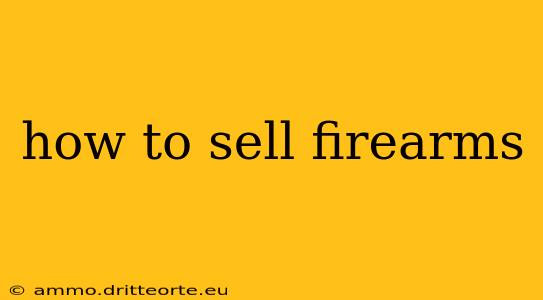Selling firearms can seem daunting, but understanding the legal requirements and safety procedures ensures a smooth and secure process. This guide provides a comprehensive overview, covering everything from assessing your firearm's value to completing the transaction safely. Remember, federal and state laws regarding firearm sales vary significantly, so it's crucial to research your specific location's regulations before proceeding. Failure to comply with these laws can result in serious penalties.
Assessing Your Firearm's Value
Before listing your firearm, accurately determine its value. Several factors influence price:
- Make and Model: Certain brands and models command higher prices due to reputation, rarity, or features.
- Condition: Scratches, wear, and functionality significantly impact value. A pristine firearm fetches more than a well-used one.
- Accessories: Included accessories, such as scopes, holsters, or extra magazines, increase the overall value.
- Market Demand: Current market trends and the demand for specific firearms influence pricing. Research online marketplaces and auction sites to gauge current prices for comparable firearms.
Websites and resources dedicated to firearms appraisal can help determine a fair market value. However, it's essential to consider the condition and included accessories when establishing your asking price.
Legal Requirements for Selling Firearms
Federal Law: Federal law dictates that licensed firearms dealers (FFLs) are generally required to conduct background checks on all firearm purchasers. The specifics of when a private seller must use an FFL vary by state.
State Laws: This is where things get complicated. State laws regarding private firearm sales differ dramatically. Some states require background checks for all firearm transfers, even between private citizens. Others have stricter regulations regarding certain types of firearms or require registration. It is absolutely critical to understand the laws in your specific state before attempting any sale. Your state's attorney general's website or a consultation with a legal professional specializing in firearms law is highly recommended.
Choosing a Sales Platform
Several options exist for selling firearms:
- Licensed Dealers: Selling to a licensed dealer is generally the safest and most legal method. They handle all background checks and paperwork, removing much of the burden and potential liability from the seller. However, they typically offer lower prices compared to private sales.
- Online Marketplaces: Online platforms dedicated to firearms sales exist, but exercise caution. These platforms often have their own terms of service and requirements, and verifying the buyer's identity and legality is your responsibility.
- Gun Shows: Gun shows offer a chance to interact directly with potential buyers but also carry significant legal and safety risks. Be sure to adhere to all applicable state and local regulations.
- Private Sales: Private sales, while potentially offering higher prices, often involve more legal complexities and safety concerns.
Safe Handling and Transaction Procedures
Regardless of the chosen platform, prioritize safety:
- Secure Storage: Keep your firearm unloaded and securely stored until the sale is completed.
- Background Checks (when required): Strictly adhere to all state and federal background check requirements. Never sell to anyone you suspect might misuse the firearm.
- Meet in Public Places: Always conduct the transaction in a safe, well-lit public location with other people present, such as a gun shop or police station.
- Bill of Sale: Create a written bill of sale detailing the firearm's information, the buyer's and seller's information, and the sale price. This serves as proof of a legitimate transaction.
- Verify Identification: Always request and verify the buyer's identification to ensure they are legally permitted to purchase a firearm.
Disclaimer:
This guide provides general information and should not be considered legal advice. Always consult with legal professionals and thoroughly research your state's specific laws regarding firearm sales before undertaking any transaction. The safety and legality of the transaction are entirely the seller's responsibility.

